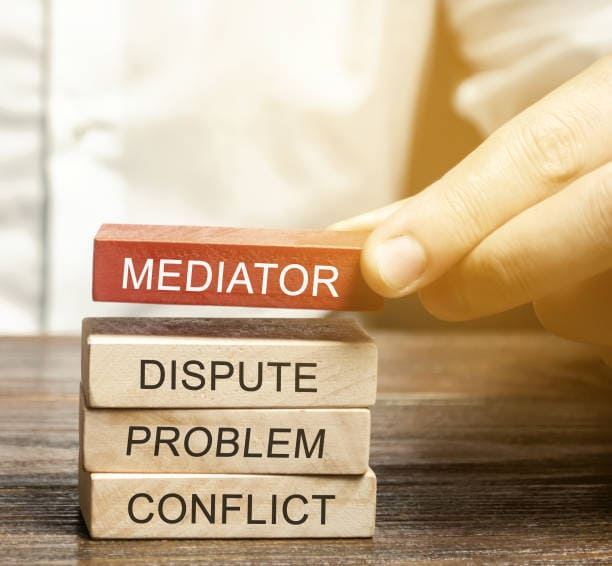Who is a divorce mediator? A divorce mediator is a professional who helps divorcing and separating couples make amicable resolutions for their disputes in relation to parenting arrangements and/or property settlement. It is important to note that the mediator does not make decisions for them. Why?
Mediators only act as a third party in disputes and it is up to the disputed parties to show genuine effort to resolve their disputes rather than going to court. However, the courts may intervene if the case is too complex or serious. Indeed, some family law matters just involve two partners who want a divorce and property settlement. However, there may be more serious and extreme and complex cases such as:
- Family law matters with extended family members
- Validity of marriages
- Domestic violence
- Complex child custody disputes.
- High-value property and/or assets involved in property settlement cases
Family courts will also usually urge disputed parties to go through mediation or arbitration before they exercise any power on their case. Mediation and arbitration are referred to as alternative family dispute resolution methods. These methods are typically less formal compared to court procedures and trials. Hence, most parties should opt for a divorce mediator instead of opting for costly court procedures.
What Does the Family Law Act 1975 Say?
The Family Law Act 1975 is the primary legislation that governs family law matters in Australia. The Act sets out provisions for principles and procedures for dispute resolution related to marriage, de facto relationships, and children. The Family Law Act encourages parties to consider using divorce mediation as a way to resolve family law disputes about children and property.
Who Can Act as a Divorce Mediator?
In Australia, no specific qualifications or training are required to act as a divorce mediator. However, it is best to select a mediator who has completed a professional mediation training programme and has relevant experience. There are a number of professional associations that certify or accredit mediators in Australia. Some of these are the:
- Australian Mediation Association (AMA); and
- National Mediator Accreditation System (NMAS)
- Australian Institute of Family Law Arbitrators and Mediators (AIFLAM)
These organisations provide training, accreditation, and ongoing professional development for mediators. It’s a good idea to choose a mediator who is a member of one of these professional bodies. This is because they are held to a certain standard of practice and code of conduct.

Advantages of Mediation
1. Cost and Time-efficient
Mediation is generally less expensive than a traditional divorce. This avoids the cost of court procedures that will naturally include filing fees for legal documents. Mediation can be completed in a shorter period of time than a traditional divorce, which can take months or years to resolve. This dispute resolution method is typically faster than traditional divorces due to:
- Less paperwork
- No delays
- Single point contact (the mediator)
2. More Control
The divorce mediation process gives the parties more control over the outcome of their divorce. But, how is this so? Disputed couples are the ones who make the final decisions about their settlement. The divorce mediator is only there to provide support and guidance.
4. More Privacy
Mediation process is private, whereas a traditional divorce can be a matter of public record. Court proceedings, including hearings and trials, are open to the public, and the final judgement is a matter of public record. This means that anyone can access information about the divorce, including the details of the settlement agreement.
Mediators are dedicated to keeping a mediation session private to help disputed couples be more transparent with their sentiments. Hence, this less confrontational process than a traditional one can reduce stress and emotional turmoil for the parties. As a result, parties are more likely to come to an agreement rather than escalate the matters to court.
5. Better for Children
A divorce mediator can help minimise the negative impact of divorce on children and child custody. How? These mediators can focus on the needs of the children and work towards a solution that is in the child’s best interest. We have published a blog about the best interests of the child here. Section 60CC of the Family Law Act also provides provisions for the child’s best interests.
Tips for Hiring a Divorce Mediator
1. Check for certifications and qualifications: People may look for a mediator who has completed a professional training program in mediation and has experience in the field. Clients may also check if the mediator is a member of professional associations such as the AMA or the (NMAS).
2. Look for experience: Experience is one of the key factors that define a successful mediator. Experienced mediators have a better understanding of the legal and emotional issues involved in divorce.
3. Get referrals: Ask friends, family, or a lawyer for recommendations. In fact, some lawyers may even act as mediators which can save time for disputed parties who want to look for a mediator. Most law firms also have online reviews for their services.
4. Check their availability and location: People should make sure their divorce mediator is available to meet with clients at times that are convenient for them. Secondly, people may choose a mediator who is located close to them so they may attend mediation sessions easily. JB Solicitors has three offices locations and we also offer online consultations. Our office locations are:
- Sydney CBD Office: Level 20, 233 Castlereagh St, Sydney NSW 2000
- Canley Heights Office: Suite 3, Level 1/203, Canley Vale Rd. NSW 2166
- Bondi Junction Office: 103/332-342 Oxford St., Bondi Junction NSW 2022
6. Consult with the mediator: People should have an initial consultation with a family law solicitor or mediator to discuss their case, and evaluate their qualifications and experience.
7. Check their fees: Clients may ask about the mediator’s fee structure and make sure they understand what is included in their services. All law firms charge various fee types like hourly fees, contingency fees, and fixed/flat fees.

Importance of Seeking Legal Advice
JB Solicitors have accredited mediators and arbitrators that can aid in various legal matters such as corporate, immigration, and family law matters. Our team is knowledgeable about the divorce process and its legal implications in family law.
As a result, we can provide professional and market-leading legal advice to disputed parties. Contact a divorce mediator today for a successful mediation.
